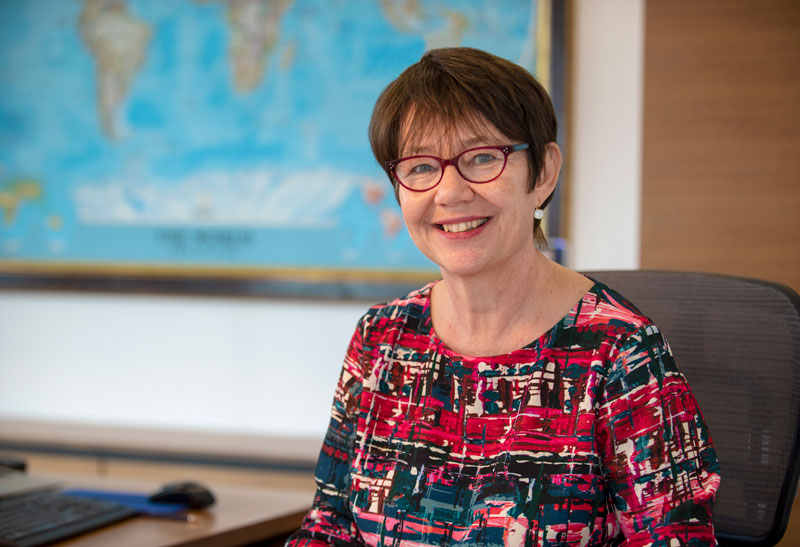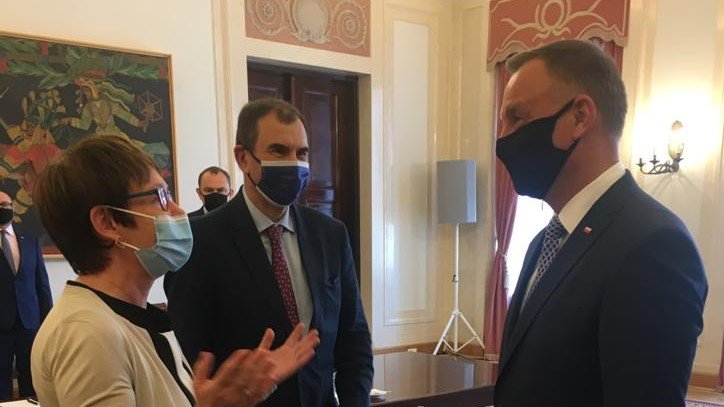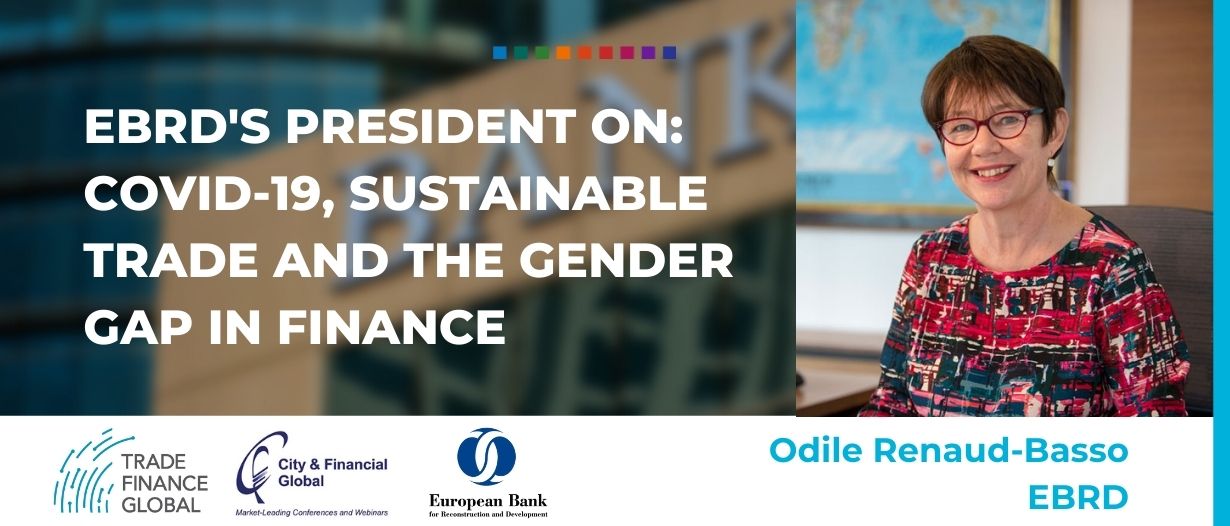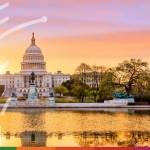TFG’s Joana Fabiao interviewed Odile Françoise Renaud-Basso, the president of the European Bank for Reconstruction and Development (EBRD), on COVID-19, sustainable trade and the gender gap in finance for City Week 2021.
Odile Françoise Renaud-Basso came to her position as president of the EBRD after her role as a Director-General of the French Treasury and chair of the Paris Club.
Her years of experience provided her with expertise in financial issues, economic policy conduct in different countries, multilateral and international relations, negotiation and consensus-building, as well as experience in managing large organisations. All of these are key competencies for her role as the president of the EBRD.
Odile joined the EBRD last year, right in the middle of the Covid-19 pandemic with three simple aims:
- Support EBRD in its continued effort to provide and to increase, its delivery in support of the private sector. This is the EBRD’s USP and an area where the Bank needs to continue to be at the top everywhere it works
- Support the environmental and energy transition of the countries where EBRD invests. This despite being a significant challenge, is one of EBRD’s core responsibilities
- Develop EBRD’s human resources – the quality and diversity of staff – fostering and developing inclusivity as the world weathers a crisis that, as well as everything else, has made us consider anew the future of work

Development Bank stepping up during the unprecedented health crisis
The impact on EBRD’s objectives
According to Odile, Covid-19 has radically changed the way we work, and not just because most bank staff have been working remotely since March 2020.
“In the very short term, the key priority for EBRD was to provide rapid financial support to businesses and policy engagement in its countries of operation. Driven by necessity, EBRD focused on liquidity support for companies to prevent lockdown measures from triggering economic collapse with big bankruptcies and mass unemployment. As a result, EBRD made a record high investment of €11 billion in 2020, as well as, being the first multilateral development bank to provide an emergency support package.”
Odile Françoise Renaud-Basso
Once liquidity is ensured, EBRD aims to focus on ensuring that companies have sufficient resources to finance their development, once liquidity is ensured. Now EBRD needs to focus on supporting investment and the capacity to rebound and develop new markets and activities.
As the vaccine rollout leads to a reopening of the economy EBRD stand by the countries they invest in and are prepared to support their recovery.
The impact on EBRD’s strategy
JF: How has the pandemic impacted EBRD’s 2021-25 strategy?
ORB: Post-pandemic, the urgent need for the bank is to rebuild stronger and better, with this being reflected in EBRD’s 2021-25 strategy. This strategy is focused, therefore, on the bank’s determination to combine recovery with the prioritisation of green finance, equality, inclusiveness and digitalisation. By seizing the moment and using the need for recovery and stimulation, EBRD will make some of the very big investments needed to tackle climate change, bringing about the green economic transition to a low-carbon future.
The pandemic has revealed certain global over-dependencies, which must be addressed. In the long-term, the COVID-19 pandemic may lead to the reorganisation of global value chains and production across the world because the crisis has revealed certain over-dependencies. This has the potential to become an opportunity for several countries where the EBRD operates, as well as possibly attracting investment and rebuild manufacturing activities.
In summary, EBRD is committed to preserve and accelerate the transition, helping to prepare for the post-virus era and safeguard everything the bank has achieved so far in building sustainable, fair and open market economies.

EBRD’s continued focus on Africa
The EBRD has been operating in North Africa, Egypt, Tunisia and Morocco, for almost 10 years. Following the Arab Spring, the international community asked the EBRD to develop its value proposition in these countries with the aim to help them in their transition towards a market-oriented economy. The last years have shown the value of this decision, as EBRD have deployed their business model efficiently and invested, specifically, in green projects and SMEs support. Odile believes the EBRD can bring similar value to some Sub-Saharan countries, all the more because this region represents a challenge for Europe to promote stability and development in its neighbourhood. As the EBRD’s mandate is to promote the private sector, the bank could help to generate wealth and increase living standards through the promotion of entrepreneurship.
It is important to focus on cooperation rather than competition, Odile warns.
Climate change: an urgent call to action
Climate objectives have been at the core of EBRD’s activity for many years, however, the scale and urgency of this issue cannot be ignored. The Green Economic Transition approach is aiming to target green investments of at least 50% of EBRD’s annual business volume by 2025, whilst also ambitiously working towards aligning with the goals of the Paris Agreement. At the bank’s Annual Meeting taking place this week, the Board of Governors will be asked to fully align all activities with the Paris goals by the end of 2022.
In 2021 the world stands at a turning point, facing an urgent call to action as the impacts of climate change become ever more obvious, Odile highlights.
“We know that CO2 emissions need to fall by around 45% by 2030 and reach net-zero by mid-century to limit warming to 1.5C. We have less than a decade to put those changes into effect.”
Odile Françoise Renaud-Basso
The Green Climate Fund
The Green Climate Fund (GCF) is the largest climate fund in the world to support the efforts of developing and emerging economies in response to climate change. After the EBRD was accredited by the GCF Board in 2015, it developed a pipeline of projects that will respond to the Fund’s objectives. Over the next six years, this partnership for transformation saw the GCF support six EBRD programmes with US$ 830 million, catalysing more than US$ 3.6 billion in total project value.
Now the partnership has been enhanced further. The main objectives of the new US$ 1.01 billion “High impact programme for the corporate sector”, signed in April 2021, are:
- the promotion of the uptake of low-carbon technologies in the industrial sector
- the facilitation of a transformational shift within the energy-intensive industries, agribusinesses and the mining sector
The Fund will support the corporates in formulating a low-carbon pathway, along with a concrete action plan of realistic investment and a strategic review of their business model as part of their corporate climate governance undertakings.

Addressing the gender diversity gap in development finance
As previously stated, Odile has a well of experience from her multiple positions within the finance industry. As it can be challenging for women to enter this heavily dominated industry, TFG asked Odile if she had any advice for other women entering their careers right now, given the current market, and continued challenges around gender inequality
Odile Renaud-Basso said: “Inequality is a very important issue for us at the EBRD and also for me personally. Inequalities have been growing, and of course, the COVID-19 crisis has added to this challenge and probably exacerbated inequalities within countries.
Inequality can have an impact on economic development and growth. Growth depends on inclusion, and economic and political stability depend on the confidence people feel in their society’s institutions. When there is the feeling that things are unfair, and equal opportunities are not there, then trust is undermined.”
Odile went on to highlight the importance of individuals with the same gifts or skills to make use of them, regardless of gender, country of origin or personal circumstances.
EBRD understands the pivotal role of equality and the need to ensure it is provided. This is reflected in the bank’s current five-year strategy, with equality being one of the top priorities alongside climate action and digitalisation.
Odile Renaud-Basso advice to women entering the workplace now is to believe in themselves and their abilities, to seek support from employers and governments who understand the economic and political importance of equal opportunities.
TFG supports women in trade, find out about TFG’s recent campaign to support Women in Trade here.
Podcast: Multilateral Perspective – A Roadmap for Sustainable Trade Finance with Maria Mogilnaya, EBRD, Roberto Leva, ADB and Inho Lee, IFC.
























